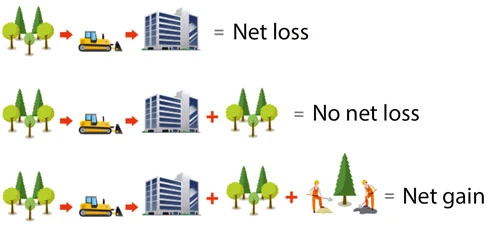What is biodiversity and why do we need it?
Biodiversity is the name we give to the variety and the amount of all life on Earth, this includes plants, animals, bacteria and fungi. For our planet to stay healthy we need a large variety of plants and animals. Without this we will not have the healthy ecosystems that we rely on to provide the air we breathe and the food we eat. Nature also plays a critical role in how we mitigate and adapt to climate change, and in supporting our mental and physical wellbeing.
Watch this short video from the Natural History Museum to learn more about biodiversity on YouTube and why we need it.
Why is it in decline?
Like the rest of the country, biodiversity in Dorset is in rapid decline. Over 400 land and freshwater species recorded in Dorset in the past are now thought to be extinct. Activities like building, pollution, industrial farming and forestry, and climate change have all contributed to this loss of wildlife in our county.
What is biodiversity net gain?
Biodiversity net gain (BNG) is an approach to development that aims to leave the natural environment in a measurably better state than it was beforehand, and forms part of the Environment Act 2021.
In 2024 it became mandatory in England and developers are now required to deliver a biodiversity net gain of at least 10%. This means developments need to result in more or better-quality natural habitat than there was before development. For a simple overview, watch Natural England's Introduction to Biodiversity Net Gain on YouTube.

Who does it affect?
Biodiversity net gain will apply to all development that falls under the Town and County Planning Act 1990, with some exceptions such as permitted development and householder applications. And will impact on all aspects of planning and place making.
The individuals and groups which will be most impacted and will need to understand the requirements of biodiversity net gain are:
- developers
- local planning authority
- land managers wanting to sell in the biodiversity net gain market
What is Dorset Council’s role?
As a local planning authority, Dorset Council will need to make sure developers and land managers meet the requirements for biodiversity net gain.
We will be responsible for:
- setting local policies and strategies to support biodiversity net gain
- approving and reviewing planning applications and biodiversity gain plans
- checking biodiversity metric calculations
- checking habitat surveys
- checking developers selling excess on-site gains
- checking the biodiversity gain sites register for off-site gains
- secure gains with a legal agreement
- monitoring biodiversity net gain
- working with developers who wish to buy biodiversity net gain credits
We strongly advise anyone making a planning application to consider their biodiversity net gain strategy at the earliest opportunity (ideally before the application is submitted) to avoid delays during the planning application process, including at determination and approval of the biodiversity net gain measures.
For more information on biodiversity net gain within the Dorset Council area and what we will expect from planning applications, please read our Biodiversity Net Gain: Guidance for Applicants and Agents.
What is a habitat bank?
A habitat bank is an area of land where habitats are created or enhanced to generate biodiversity units. Developers can purchase these biodiversity units to meet their Biodiversity Net Gain (BNG) obligation. This aspect of BNG is part of the UK government's strategy to ensure development projects result in a measurable improvement in biodiversity. As well as helping developers, habitat banks are also therefore one way that landowners can realise an income from their land. Habitats are secured for 30 years, by legal agreement, ensuring BNG is additional to existing mechanisms, funding, and initiatives.
Habitat banks are intended to contribute to healthy local ecosystems and environmental sustainability by creating strategically located habitats in hand with the Dorset Local Nature Recovery Strategy.
Habitat Banks in Dorset
Dorset Council has secured two habitat banks in the county. One is at Purns Mill near Gillingham and the other at The Ferals Farm near Tarrant Keyneston, Blandford Forum. Biodiversity units from the banks are now available for biodiversity unit purchase on the national register.
Copies of the agreements are available to view below:
Dorset Council is working with other landowners to create habitat banks in Dorset. Currently, landowners can submit their sites for consideration by the Council using the call for sites process - Land availability - Dorset Council. Further habitat bank criteria for landowners and their agents will be published soon.
Other habitat banks are available and can be found by searching the national register.
A copy of the Dorset Council habitat bank legal agreement template is available to view.
Where can I find out more about biodiversity net gain?
The government has produced Planning Practice Guidance (to interpret and add to the legislation) and more general guidance on biodiversity net gain. It has also provided the below step-by-step guidance:
- step-by-step guidance for developers
- step-by-step guidance for land managers
- guidance for local planning authorities (LPAs)
When will biodiversity net gain be required?
From 12 February 2024 a mandatory requirement to provide a minimum 10% BNG will apply to all applications for major development. Major development includes residential developments with 10 or more dwellings, or where the site area is greater than 0.5 hectares.
From 2 April 2024 this requirement will extend to include applications for small sites. Small sites include residential development where the number of dwellings is between 1 and 9, or if unknown the site area is less than 0.5 hectares. Commercial development where floor space created is less than 1,000 square metres or the total site area is less than 1 hectare.
You can find out more about biodiversity net gain requirements for Dorset in the ‘local list’ section of our validation checklist.
Applicants are strongly encouraged to use our pre-application advice on biodiversity net gain service to avoid delays through the planning process.
Useful links
- benefit from our pre-application advice on biodiversity net gain
- view government guidance on understanding biodiversity net gain
- read more about biodiversity net gain on Defra’s Environment Blog
- find a range of biodiversity net gain resources on the Planning Advisory Service website
- read Dorset Council’s Biodiversity Net Gain: Guidance for Applicants and Agents
- find out what is needed on biodiversity net gain for your planning application in Dorset Council’s validation checklist
- find out more about planning applications and requirements on Dorset Council’s planning webpage
- check out Natural England’s Biodiversity Net Gain brochure for an overview of biodiversity net gain and its benefits
